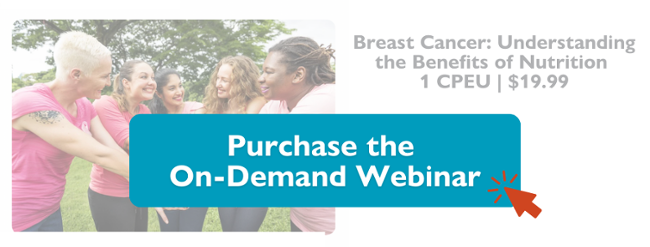Dietitian Blog, MNT Guidelines | Oct 11 2022
Breast cancer: Helping your patients separate fact from fiction

Breast cancer is one of the leading causes of cancer in the United States and is diagnosed in 1 out of 8 women. Cancer occurs in the ducts, lobules, or connective tissue of the breast and has the potential for metastasis to other parts of the body with use of lymph or blood vessels.
Treatment is determined based on the stage of the cancer and can involve surgery, radiation, and chemotherapy. As part of the care process, the registered dietitian nutritionist (RDN) is an integral part of the multidisciplinary team and all patients with breast cancer should be screened for nutrition risk. In honor of breast cancer awareness month, let’s take a closer look at the importance of nutrition with this group of patients.
Risk Factors
Risk factors for breast cancer fall into the categories of modifiable or non-modifiable. Non-modifiable factors are risks out of the individual’s control and include age, gender, ethnicity, and breast tissue density. Modifiable risk factors on the other hand include behaviors that can be changed. Physical activity, diet, weight status, and certain medications can all factor into this category. In general, experts recommend a healthy lifestyle with a balanced diet and regular physical activity to lessen the chance for developing breast cancer.
Diet specifics
With breast cancer being a more common diagnosis, there is a wide range of nutrition advice available. Sorting through this information to find what is truly evidence-based can be difficult. As an RDN, you may get a variety of questions. Being able to separate fact from fiction is helpful in keeping you and your patient on the right track. When working with a patient with breast cancer, be sure to encourage the following guidelines as part of the recommendations from the American Cancer Society (ACS).
Reduce fat intake. Of the available research, increased intake of dietary fat strongly correlated with an increased risk for breast cancer, particularly in postmenopausal women. Ideally, individuals should maintain fat intake to 15 to 20% of their total energy consumption and limit sources high in saturated fat and cholesterol.
Choose soy products. Soy often gets overlooked because of the concern that these isoflavone-containing foods compete to bind to estrogen receptors and can increase breast cancer risk. Recent research suggests that this is not the case. Instead, soy should be included as part of a healthy diet, contains valuable antioxidant and anti-inflammatory properties, and may lower breast cancer risk.
Incorporate dairy items. Individuals with breast cancer may avoid dairy products in their diet because of the worry that these foods contain added hormones. Currently there is no evidence to suggest that intake of dairy products increases the risk for breast cancer. Rather, the calcium and vitamin D found in dairy products can be beneficial, especially when foods selected are low fat.
Limit excess alcohol. Drinking in moderation is a standard recommendation for the healthy adult. Alcohol consumption can raise blood estrogen levels because of a change in normal metabolism. In women who drink more than two alcoholic beverages per day, the risk for developing breast cancer is 20% higher. Research continues in this area but for those individuals at higher risk, reducing or eliminating alcohol is encouraged.
Hold the red meat. While a good source of protein, experts encourage reducing intake of red meat to three servings or less per week. These sources can be high in fat and cholesterol, both of which have been associated with an increased risk for breast cancer. Instead, replace red meat with plant-based protein sources or lean poultry.
Increase fruit and vegetable intake. Across the board, more and more studies are finding that increased fruit and vegetable intake is beneficial to fight disease, and this is no different with breast cancer. Choose two to three servings per day of a variety of different colors from each of these food groups. One added perk is that many sources naturally contain fiber, another goal to meet as part of a healthy diet.
Patient application
The ACS Guideline on Diet and Physical Activity for Cancer Prevention and the ACS Survivorship Care Guideline help to establish recommendations for prevention of cancer and long-term goals for the individual in cancer remission. These recommendations include specifics on health promotion through diet and exercise, monitoring quality of life, and encouraging compliance with any prescribed medication therapy.
Optimizing the patient’s diet before or after breast cancer diagnosis plays a huge role in their overall health. Changes don’t have to be complex. Simple diet modifications such as increasing fruits and vegetables, selecting low-fat dairy products, or cutting back on red meat are just a few ideas for improving diet to lower risk for cancer.
Dietitians On Demand is a nationwide staffing and recruiting company for registered dietitians, specializing in short-term, temporary and permanent-hire positions in acute care, long term care and food service positions. We’re dedicated to dietitians and helping them enhance their practice and excel in the workplace. Check out our job openings, request your coverage, or visit our store today!
References:
American Cancer Society. American Cancer Society/American Society of Clinical Oncology Breast Cancer Survivorship Care Guideline. Available at: https://www.cancer.org/health-care-professionals/american-cancer-society-survivorship-guidelines/breast-cancer-survivorship-care-guidelines.html. Accessed September 3, 2022.
Brown L. Medical Nutrition Therapy for Breast Cancer. In: Oncology Nutrition for Clinical Practice. 2nd edition. United States: Academy of Nutrition and Dietetics; 2021:346-373.
Levin R. Nutrition Risk Screening and Assessment of the Oncology Patient. In: Oncology Nutrition for Clinical Practice. 2nd edition. United States: Academy of Nutrition and Dietetics; 2021:58-73.
Susan G. Kormen. Diet and Breast Cancer. Available at: https://www.komen.org/breast-cancer/risk-factor/diet/. Accessed September 3, 2022.
Who we are
Dietitians On Demand is the nationwide leader in providing dietitians with jobs they love. If flexibility, competitive pay, a full benefits package, free CPEUs each month and a team dedicated to dietitians sound good to you, apply to our positions today.





